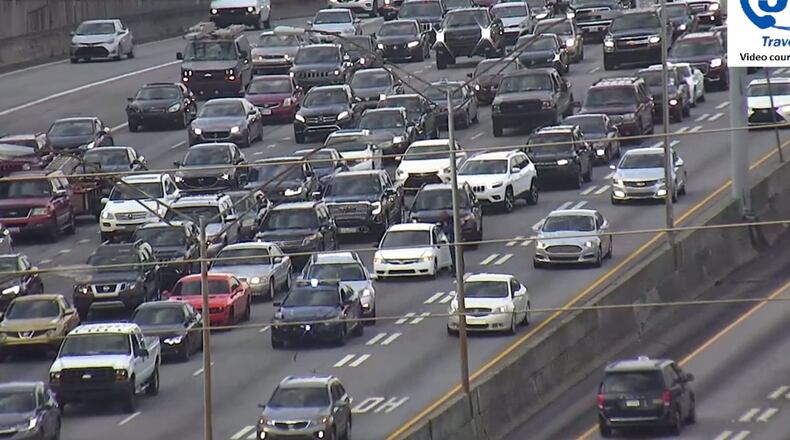As 2021 screams around its final turn, we turn some brief leaves on a few traffic stories of recent interest in Metro Atlanta.
Atlanta surprisingly low in 2021 traffic rankings
Isn’t that funny? Traffic seems really bad and especially so since the fall time-change, but it actually pales in comparison to the jams people around the world experience, traffic data firm INRIX reports.
Their annual Global Traffic Scorecard ranks Atlanta with the 10th-worst traffic in the U.S., based on hours lost per year in congestion. Atlanta was 22nd-worst in the country last year.
COVID-19 shutdowns and habits took the sap out of traffic jams around the world, as Atlantans only lost 20 hours per driver in 2020, by this measure. We lost 53 in 2021, based on 10 months of data extrapolated over the final two months.
Atlanta drivers lost 82 hours in traffic in 2019, pre-pandemic. INRIX said that Atlanta still has 16% fewer downtown trips than in 2019 and 36% less congestion.
INRIX uses GPS data for these metrics and compiles data for 1000 cities worldwide. New York City, Chicago, and Philadelphia are the top three U.S. cities with the worst delays, but their delay-numbers are also still far off of 2019′s. People have taken to and stayed telecommuting, even if COVID cases are low in their region.
London has the worst traffic in the world and is only 1% off of its 2019 numbers. Atlanta is only 59th, but was 174th a year ago.
INRIX said last year that Atlanta’s lack of reliance on mass transit meant there was less of an increase in vehicle-traffic when subways closed or people were scared to take them. The city’s apathy to MARTA meant that changes in mass transit habits added very little to traffic on the roads.
Atlanta has had and still does have notoriously bad traffic and traffic rankings really mean nothing. Different metrics show Atlanta fluctuating in these lists even within a year.
But, despite the fact that Georgia opened earlier than most states, new commuting habits have made traffic better - in some respects, anyway.
String of hit-and-run tragedies in recent days mar Atlanta roads
The AJC’s Alexis Stevens detailed a tragic rash of fatal crashes where offending drivers fled scenes.
Driving distracted and reckless and causing such pain and misery is bad. Not owning up to the terrible consequences is far worse. The fleeing driver leaves a trail of terror behind and has to carry their own guilt and paranoia, something that no sports car can outrun.
Jasmine Gaither stood on the side of I-85 in DeKalb County, a passenger in her friend’s car that had just been in a four-vehicle wreck Friday night, December 3rd. Another passing car lost control and struck and killed Gaither, just shy of her 32nd birthday. Her sister, Brittany Flournoy, said she and Gaither had lost their mother in a fatal crash back in October, too.
Flournoy and her family approach Christmas bearing the weight of two avoidable tragedies.
Police arrested Lester Rodriguez within a couple of days and are charging him with vehicular homicide and driving on a suspended license, Stevens reported.
In neighboring Gwinnett and on the same night, two cars ran over and killed 55-year-old Julio Sandoval on Singleton Road at Thompson Parkway. Gwinnett PD told Stevens that they haven’t made an arrest.
Chamblee PD has not arrested the driver that ran over and killed a man at 3:30 last Monday afternoon. They shut down Chamblee Tucker Road east of Buford Highway for over an hour, as they investigated. CPD is asking the public for leads.
One thing we all can control is how we handle crash scenes and how we cross the streets: with care. Stay in vehicles after a crash; sitting inside a stopped car is much safer than standing outside. And cross roads safely, after looking both ways multiple times, and, if possible, in crosswalks and well-lit areas.
Traffic safety firm: seniors need newer cars
We have covered this topic here before, as studies have shown that teens fare better in cars with more safety features.
The Insurance Institute of Highway Safety has also recently sung the same tune for drivers 70 and older.
Buy newer rides, they say.
While the numbers IIHS crunched indicate septuagenarians and octogenarians are crashing less often than before, they also are driving cars on an average of 16 years older than drivers 35-54-years-old.
Older drivers are generally more frugal and many are on fixed incomes, so not splurging on new cars makes some sense. But cars made in the last decade or so have several driving assists and side-impact airbags which can lessen the chance of injury or death in wrecks.
There is no fix-all solution here. However, generally, driving-ability and age begin to have an inverse relationship after age 70 and vehicles are manufactured to be safer each year.
The supply-chain backup is making the demand for new and used automobiles skyrocket, so now may not be the best time to buy. But senior citizens should at least consider upgrading to newer vehicles, if their finances allow.
Late model cars can raise insurance rates, because repair costs are higher. But the AARP driving course can sharpen skills and help lower costs.
Doug Turnbull, the PM drive Skycopter anchor for Triple Team Traffic on 95.5 WSB, is the Gridlock Guy. He also hosts a traffic podcast with Smilin’ Mark McKay on wsbradio.com. Contact him at Doug.Turnbull@cmg.com.
About the Author
The Latest
Featured

